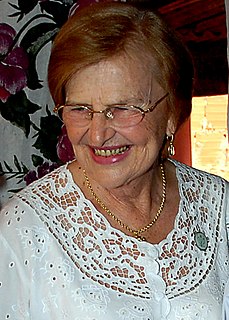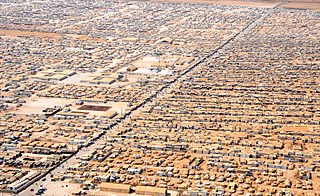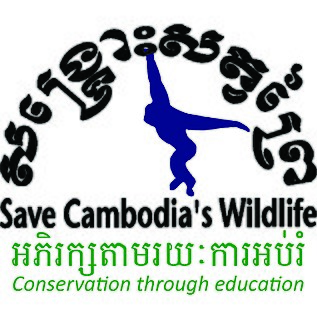Children's Care International / Aide Internationale Pour l'Enfance (AIPE-CCI) is a non-profit organization founded in 2000. Its mission is to open rehabilitation centres throughout developing countries in Asia, Africa and Latin America, to aid children who are victims of sex tourism, slavery, and all other forms of exploitation.

Asia is Earth's largest and most populous continent, located primarily in the Eastern and Northern Hemispheres. It shares the continental landmass of Eurasia with the continent of Europe and the continental landmass of Afro-Eurasia with both Europe and Africa. Asia covers an area of 44,579,000 square kilometres (17,212,000 sq mi), about 30% of Earth's total land area and 8.7% of the Earth's total surface area. The continent, which has long been home to the majority of the human population, was the site of many of the first civilizations. Asia is notable for not only its overall large size and population, but also dense and large settlements, as well as vast barely populated regions. Its 4.5 billion people constitute roughly 60% of the world's population.

Africa is the world's second largest and second most-populous continent. At about 30.3 million km2 including adjacent islands, it covers 6% of Earth's total surface area and 20% of its land area. With 1.2 billion people as of 2016, it accounts for about 16% of the world's human population. The continent is surrounded by the Mediterranean Sea to the north, the Isthmus of Suez and the Red Sea to the northeast, the Indian Ocean to the southeast and the Atlantic Ocean to the west. The continent includes Madagascar and various archipelagos. It contains 54 fully recognised sovereign states (countries), nine territories and two de facto independent states with limited or no recognition. The majority of the continent and its countries are in the Northern Hemisphere, with a substantial portion and number of countries in the Southern Hemisphere.

Latin America is a group of countries and dependencies in the Western Hemisphere where Romance languages such as Spanish, Portuguese, and French are predominantly spoken; it is broader than the terms Ibero-America or Hispanic America. The term "Latin America" was first used in an 1856 conference with the title "Initiative of the Americas. Idea for a Federal Congress of the Republics", by the Chilean politician Francisco Bilbao. The term was used also by Napoleon III's French government in the 1860s as Amérique latine to consider French-speaking territories in the Americas, along with the larger group of countries where Spanish and Portuguese languages prevailed, including the Spanish-speaking portions of the United States Today, areas of Canada and the United States where Spanish, Portuguese and French are predominant are typically not included in definitions of Latin America.
The organisation, based in Montreal Canada, receives its funding from various sponsors, and depends largely on the invaluable support provided by its partners, namely ARDAR, [1] OXFAM, and Amnesty International Children's Rights and many others.
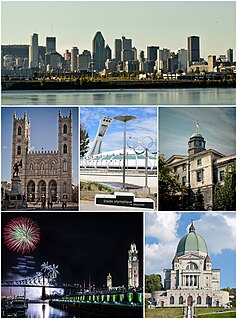
Montreal is the most populous municipality in the Canadian province of Quebec and the second-most populous municipality in Canada. Originally called Ville-Marie, or "City of Mary", it is named after Mount Royal, the triple-peaked hill in the heart of the city. The city is centred on the Island of Montreal, which took its name from the same source as the city, and a few much smaller peripheral islands, the largest of which is Île Bizard. It has a distinct four-season continental climate with warm to hot summers and cold, snowy winters.

Canada is a country in the northern part of North America. Its ten provinces and three territories extend from the Atlantic to the Pacific and northward into the Arctic Ocean, covering 9.98 million square kilometres, making it the world's second-largest country by total area. Its southern border with the United States, stretching some 8,891 kilometres (5,525 mi), is the world's longest bi-national land border. Canada's capital is Ottawa, and its three largest metropolitan areas are Toronto, Montreal, and Vancouver.
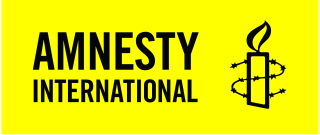
Amnesty International is a non-governmental organization based in the United Kingdom focused on human rights. The organization claims it has more than seven million members and supporters around the world.
In June 2003, Children's Care International opened the Rainbow Centre in Andhra Pradesh, India in collaboration with ARDAR, a local NGO, to help free children from slavery. The Centre is currently home to 60 children. Oxfam and ActionAid are amongst the partners helping the center.
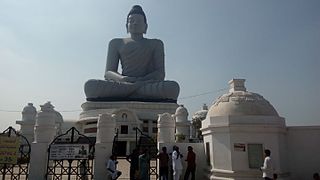
Andhra Pradesh is one of the 28 states of India. Situated in the south-east of the country, it is the seventh-largest state in India, covering an area of 160,205 km2 (61,855 sq mi). As per the 2011 census, it is the tenth-most populous state, with 49,386,799 inhabitants. The largest city in Andhra Pradesh is Visakhapatnam. Telugu, one of the classical languages of India, is the major and official language of Andhra Pradesh.

India, officially the Republic of India, is a country in South Asia. It is the seventh-largest country by area, the second-most populous country, and the most populous democracy in the world. Bounded by the Indian Ocean on the south, the Arabian Sea on the southwest, and the Bay of Bengal on the southeast, it shares land borders with Pakistan to the west; China, Nepal, and Bhutan to the north; and Bangladesh and Myanmar to the east. In the Indian Ocean, India is in the vicinity of Sri Lanka and the Maldives; its Andaman and Nicobar Islands share a maritime border with Thailand and Indonesia.

Oxfam is a confederation of 19 independent charitable organizations focusing on the alleviation of global poverty, founded in 1942 and led by Oxfam International. It is a major nonprofit group with an extensive collection of operations. Winnie Byanyima has been the executive director of Oxfam International since 2013.
Children's Care International has begun creating partnerships with companies (manufacturers, wholesalers, retailers, craftsmen, and artists) that produce and sell fairtrade products. Some of the partners include Vertimonde [2] who provide environmentally friendly and fair trade jute grocery bags, and EcoHosting, [3] a socially responsible web hosting and web development company that is pledging to donate 20% of its hosting revenues to its clients' favorite charities.

Fair trade is an institutional arrangement designed to help producers in developing countries achieve better trading conditions. Members of the fair trade movement advocate the payment of higher prices to exporters, as well as improved social and environmental standards. The movement focuses in particular on commodities, or products which are typically exported from developing countries to developed countries, but also consumed in domestic markets most notably handicrafts, coffee, cocoa, wine, sugar, fresh fruit, chocolate, flowers and gold. The movement seeks to promote greater equity in international trading partnerships through dialogue, transparency, and respect. It promotes sustainable development by offering better trading conditions to, and securing the rights of, marginalized producers and workers in developing countries. Fair trade is grounded in three core beliefs; first, producers have the power to express unity with consumers. Secondly, the world trade practices that currently exist promote the unequal distribution of wealth between nations. Lastly, buying products from producers in developing countries at a fair price is a more efficient way of promoting sustainable development than traditional charity and aid.

Jute is a long, soft, shiny vegetable fiber that can be spun into coarse, strong threads. It is produced primarily from plants in the genus Corchorus, which was once classified with the family Tiliaceae, and more recently with Malvaceae. The primary source of the fiber is Corchorus olitorius, but it is considered inferior to Corchorus capsularis. "Jute" is the name of the plant or fiber used to make burlap, hessian or gunny cloth.
Web development is the work involved in developing a web site for the Internet or an intranet. Web development can range from developing a simple single static page of plain text to complex web-based internet applications, electronic businesses, and social network services. A more comprehensive list of tasks to which web development commonly refers, may include web engineering, web design, web content development, client liaison, client-side/server-side scripting, web server and network security configuration, and e-commerce development.


